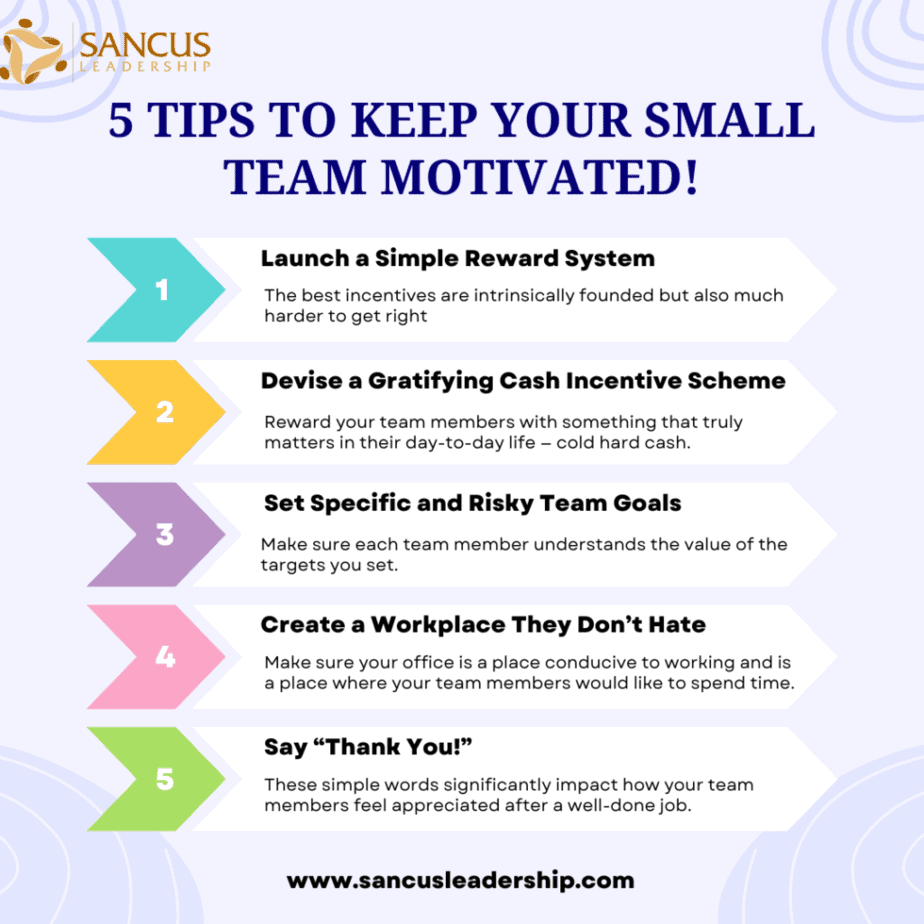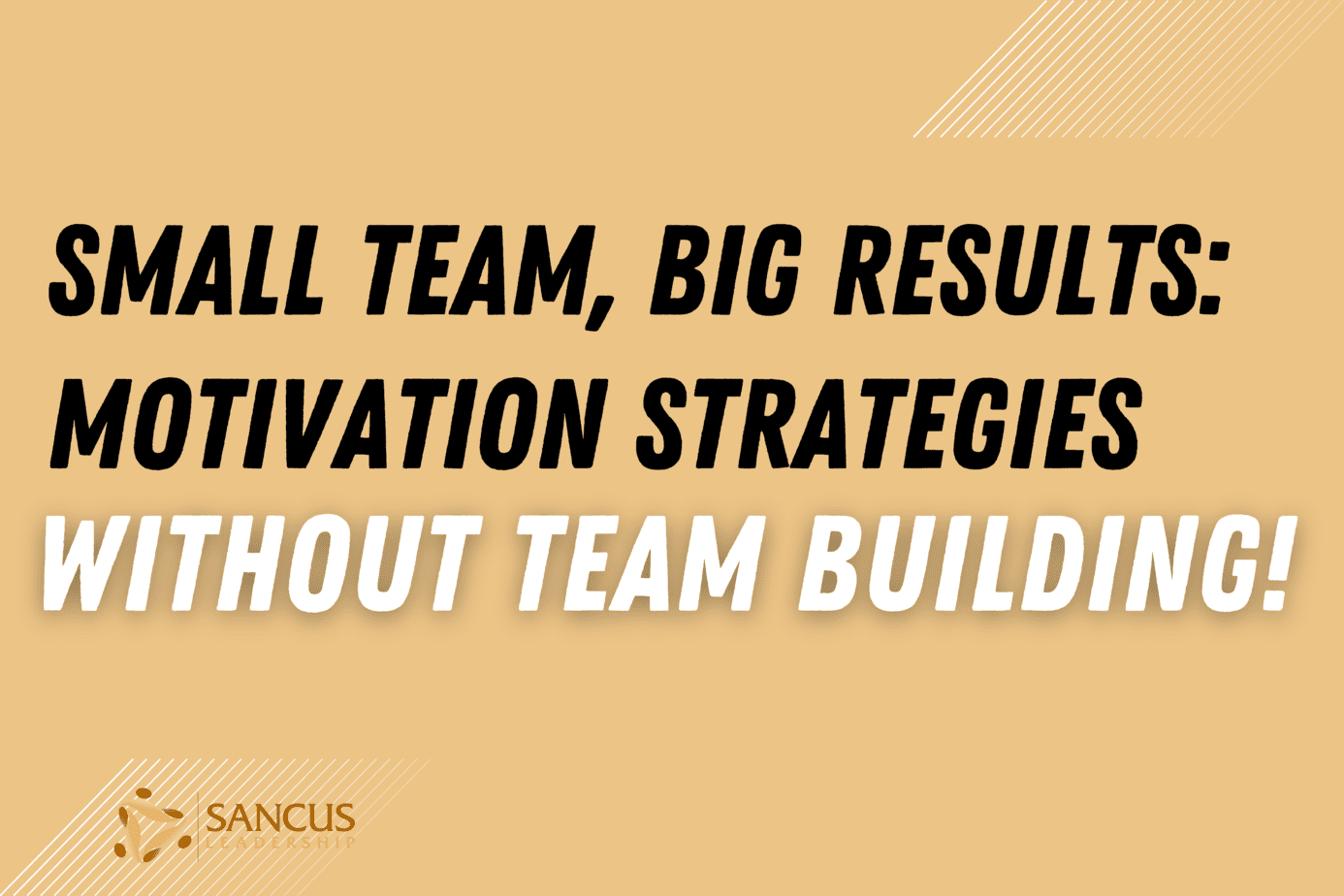Keeping your small team motivated is crucial to achieving goals. Your team members’ engagement must be among your top priorities since this is directly proportional to productivity, especially in creative endeavors. Many organizations frequently utilize team-building activities despite being proven ineffective, so how do we keep our teams motivated?
Team building activities have been proven to be insignificant in impacting morale. Instead, it would help if you leveraged intrinsic motivators, such as understanding why your employees show up for work. And complement with extrinsic motivators, such as money.
In this article, we will talk about ways to show your small team your appreciation so they will always be motivated to give their best. We will also discuss team leaders’ misconceptions about team motivation and reality. Let’s begin!
How Do You Keep a Small Team Motivated?

You can motivate a small team by consistently acknowledging their efforts and providing them with good working conditions. Show your appreciation through rewards such as gift checks, paid vacations, or cash bonuses. Ensure the targets you set are risky and specific to boost their morale.
You can motivate a small team by consistently acknowledging their efforts and providing them with good working conditions.
Keeping your team motivated is essential if you want your organization to grow and thrive. When your team members are motivated, they will be more eager to engage and share more of their time, talents, and skills. They can accomplish more tasks and help you reach your goals and objectives faster.
Old school organizations frequently turn to regular team-building activities to keep their employee morale high, even though it doesn’t work.
Launch a Simple Reward System
Rewards are external motivators and usually only work for simple and short-term projects. The best incentives are intrinsically founded but also much harder to get right.
Reward your team members for a job well done by giving them exactly what they want or need.
Reward your team members for a job well done by giving them exactly what they want or need.
Ask them what kind of rewards they prefer each time they reach a milestone at work. Here are some common rewards that could help motivate your team always to give their best.
- Friday night out. Your team members might want to relax and unwind after a particularly stressful week. It will help if you keep these types of rewards voluntary. Do not force mandatory nights out on your employees.
- Gift checks. Reward your team members with gift checks to salons, spas, or restaurants. If you give them gift checks related to health benefits, then it is also a win for your business.
- Hotel accommodations. A weekend at a nice hotel will give your employees a well-deserved break.
Devise a Gratifying Cash Incentive Scheme
Reward your team members with something that truly matters in their day-to-day life — cold hard cash. This way, they can use it for whatever purpose, for groceries, a massage, or to pay bills.
Design an escalating system that rewards good productivity. The amount team members can earn on how well they perform. For instance, those that deliver increased sales growth within a 20-25% range will receive a more considerable sum than those with only a 10-15% performance.
I am not a big fan of these systems. They are tough to design and often incentivize unwanted behavior.
Studies have shown that if the task is complex and demands creativity, monetary incentives negatively affect output.
Studies have shown that if the task is complex and demands creativity, monetary incentives negatively affect output.
Set Specific and Risky Team Goals
Make sure each team member understands the value of the targets you set.
If they do not see how realizing these goals will impact the team and the organization, they may not be motivated to do their share in the journey to success.
Ensure your teammates understand what value they gain from achieving the goal. What is in it for them?
Just as importantly, ensure that the targets are risky but attainable. If you set the bar too high, employees may feel disheartened and uninspired.
Keep your team in the loop about recent changes or developments. Update them on each other’s progress. This way, they can see their contributions’ value and appreciate how they each fit into the bigger picture.
Create a Workplace They Don’t Hate
Make sure your office is a place conducive to working and is a place where your team members would like to spend time.
The benefit of running a small team is that you can learn what it is precise that your people enjoy so you can create an environment that they like. If your people appreciate nature, give them plants; if they like art, travel to Paris and buy them the Mona Lisa. If that is within your budget.😅
The benefit of running a small team is that you can learn what it is precise that your people enjoy so you can create an environment that they like.
Most importantly, set good examples for your team to be supportive, grateful, and efficient team players.
You can also offer employees perks to help make work more enjoyable and make them feel valued. You can also promote employee well-being and a healthy mindset through these simple yet effective additions.
- Relaxation areas. Create a space for couches and bean bags where employees can relax and de-stress. Throw in a coffee machine, snacks, a TV, and books.
- Exercise spaces. Your team members might want to de-stress via physical activities during the day. Set aside a space for a treadmill, some weights, and some stationary bikes where they can loosen up during particularly demanding days.
Avoid going full-out Twitter on your workspace; you still want people to be productive.
Say “Thank You!”
Honestly, this is a big deal that many leaders fail at!
These simple words significantly impact how your team members feel appreciated after a well-done job.
Often, when employees execute tasks well or achieve goals, we view these as part of the job, and it is, but that doesn’t matter. Even if you plan to reward them later, it is still best to say “Thank you!” as soon as possible.
According to Daniel Kahneman, winner of the Nobel Prize in Economics, and the author of my favorite book, thinking fast and slow, timing is one of the essential factors of effective feedback.
Look the person in the eye while saying these words, and you’ll be surprised at the impact you make. You can also give handwritten, personalized notes conveying your gratitude.
Mention precise details about your team members, such as their punctuality, efficiency, or tenacity, that you appreciate the most and credit to their success.

Myths About Team Motivation

Many team leaders need clarification about how they can keep their team motivated. Limited financial resources make leading and managing a small group incredibly challenging.
There are a lot of misconceptions going around, but some are quite unfounded and surrounded by misjudgments. Here are a few myths about keeping teams motivated and what the actual score is.
Money Is the Only True Motivator
Some team leaders may think money, especially cold hard cash, can inspire a team to push beyond their limits.
They may be partially right but remember that money can only go so far. Ultimately, you must uncover why your team is uninspired in the first place to avoid being back at square one.
Engage with your team members and discover what it takes to keep them motivated. Listen to them and be susceptible to their needs.
You’d be surprised to learn that being valued, respected, and appreciated is what they crave the most. Rewards after strenuous work are just the icing on the cake.
Rewards after strenuous work are just the icing on the cake.
Employees Don’t Care About the Company
You may think your team members are there to do their job and get paid; some might even explicitly utter those words. This mindset will show how you interact with your team, and they will easily sense your distrust. Team members will feel they must be more appreciated and inspired to do their best.
Immerse yourself in your team and get to know your employees better. Ask about their goals, both personal and work-related.
You’ll soon realize that each team member is different and thus have varying mindsets about work. If you know your team more personally, you can align your organizational goals with theirs so you can all work together toward success.
| Myths About Team Motivation | Reality |
| Money is the only true motivator. | Money can only go so far. Being valued, respected, and appreciated is what team members crave the most. Rewards after strenuous work are just the icing on the cake. |
| Employees don’t care about the company. | Each team member is different and has varying mindsets about work. By immersing yourself in your team and getting to know your employees better, you can align your organizational goals with theirs and work together towards success. |
Here’s an insightful video of Brian Tracy sharing 6 tips that you can use to become a more powerful motivator and raise your team to new levels of success!
Final Thoughts
Keeping your small team motivated takes creativity and extra effort. Remember that some may only appreciate what works for one team member. Please get to know your employees better, uncover their needs and wants, and be creative with showing them your appreciation. The key is to make your team members feel valued for their contributions to the team and the organization.



